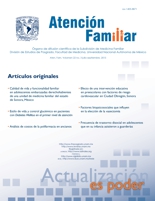Effect of an Educational Intervention in Preschool Children with Cardiovascular Risk Factors in Ciudad Obregon, Sonora
Main Article Content
Abstract
Objective: to evaluate the effect of an educational intervention in preschool children with cardiovascular risk factors of a Family Medicine Unit in the state of Sonora. Methods: it was conducted a quasi-experimental study that included children from three to five years with cardiovascular risk factors, and their parents, who applied an educational strategy in four sessions. Descriptive and inferential statistics (t student and χ2) was used. Results: 43 children were included, 62.8% boys and 37.2% girls with an average age of 3.13 years. Within the familiar background obesity represented 90.7% and hypertension and diabetes 72.1%. Blood pressure was below the 90%; the initial obesity decreased significantly, with differences between the initial and final weight, as well as the values of glucose, cholesterol and triglycerides (p=0.00). Conclusions: an educational strategy for the family, focused on modifying the risk factors through good eating and physical habits, has a positive and significant effect in reducing cardiovascular risk factors, both physical and biochemical, present during preschool.
Downloads
Download data is not yet available.
Article Details
How to Cite
Castañeda-Sánchez, O., & Ruelas-Oliveros, G. (2015). Effect of an Educational Intervention in Preschool Children with Cardiovascular Risk Factors in Ciudad Obregon, Sonora. Atención Familiar, 22(3). https://doi.org/10.22201/facmed.14058871p.2015.3.50730
